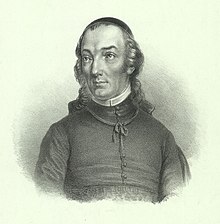| Dávid Baróti Szabó | |
|---|---|
 Dávid Baróti Szabó Dávid Baróti Szabó | |
| Born | (1739-04-10)10 April 1739 Baraolt, Transylvania |
| Died | 22 November 1819(1819-11-22) (aged 80) Virtj |
| Occupation | Jesuit priest, poet, writer, linguist |
| Nationality | Hungarian |
Dávid Baróti Szabó (10 April 1739 – 22 November 1819) was a Hungarian Jesuit priest, poet, writer and linguist.
Early life
Born into a noble Szekler family from Transylvania, he entered the Jesuit order in 1757 in Székelyudvarhely (today Odorheiu Secuiesc in Romania), then studied and taught in different places in then-Hungary (Trencsén, Szakolca, Székesfehérvár, Nagyszombat, Kolozsvár, Eger) until his ordination as a priest in 1770 in Kassa (now Košice in Slovakia). He was a teacher at Nagyvárad high school (today Oradea in Romania), then finished his spiritual formation ("third year") in Besztercebánya (today Banská Bystrica in Slovakia). After the dissolution of the Jesuit order in 1773, he taught at Komárom, then from 1777 to 1799 at Kassa, and then retired to his former pupil Benedek Pyber, at Virt in the county of Komárom, having obtained from Emperor Francis I a pension of 600 Austrian guilders as a reward for his literary activities.
Work
In Kassa, in 1788 he launched and edited with Ferenc Kazinczy and János Batsányi the first literary periodical published in the Hungarian language, the Magyar Museum.
He was one of the poets of the "national" Hungarian movement of the nobility (nemesi-nemzeti), defending the Hungarian language and customs and praising Hungarian bravery (virtus), without however taking part in the movement of the Hungarian Jacobins of 1794 who opposed the conservative absolutism of Emperor Francis I, as did his younger friends Kazinczy and Batsányi who were arrested and sentenced.
He is also one of those who, at the end of the 18th century, introduced metrical versification into Hungarian poetry, based on the long and short syllables of Hungarian, following the example of Greek and Latin versification. He participates in the movement of revival of the Hungarian language (nyelvújítás), and sought to refresh the poetic language by the use of dialectal words and lexical creations. His poetry is actually less significant and less famous than his role as a pioneer of poetic language and form, which led to the possibilities exploited by early 19th-century poets like Dániel Berzsenyi and Mihály Vörösmarty.
His main works are:
- Új mértékre vett külömb verseknek három könyvei , Kassa, 1777;
- Ki nyertes az hang-mérséklésbenn? , Kassa, 1787;
- Baróti Szabó Dávid költeményes munkáji , Kassa, 1789;
- Orthographia és grammatikabéli észrevételek a magyar prozódiával együtt , Komárom, 1800 – two works resulting from the controversy over language and versification (in which he opposes József Rájnis and Miklós Révai);
- Magyarság virágai , Komárom, 1803;
- Virgilius Aeneiss — poetic translation in Hungarian, vol. 1: Vienna, 1810, and vol. 2 with Eclogák : Pest, 1813.
References
- ^ Ágnes, Kenyeres (1967). "Baróti Szabó Dávid". Magyar életrajzi lexikon I. (A–K) (in Hungarian). Budapest: Akadémiai kiadó. ISBN 978-963-05-2497-1..
- József, Szinnyei (1891). "Baróti Szabó Dávid". Magyar írók élete és munkái (in Hungarian). Vol. I. Budapest: Hornyánszky.
- István, Sőtér; Pál, Pandi (1965). "Baróti Szabó Dávid". A magyar irodalom törtenete (in Hungarian). Vol. 3 (1772–1849). Budapest: Akadémiai. ISBN 963-05-1642-X.
- ^ Géza, Hegedüs (1995). "Baróti Szabó Dávid". A magyar irodalom arcképcsarnoka (in Hungarian). Budapest: Trezor. ISBN 963-7685-55-3.